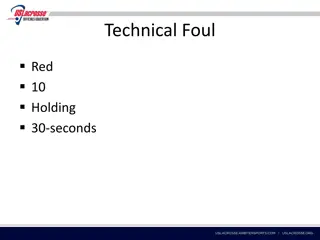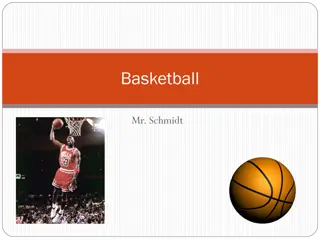Understanding Basketball: Rules, Equipment, and More
Basketball is a team sport played on a rectangular court where players aim to score by shooting a ball through a hoop. Learn about the history, rules, equipment, and objectives of the game. Dr. James Naismith invented basketball in 1891, and it has evolved into a popular sport with various competition formats. Essential equipment includes the ball and court, while competitive levels require additional gear like clocks, scoreboards, and possession indicators.
Download Presentation

Please find below an Image/Link to download the presentation.
The content on the website is provided AS IS for your information and personal use only. It may not be sold, licensed, or shared on other websites without obtaining consent from the author. Download presentation by click this link. If you encounter any issues during the download, it is possible that the publisher has removed the file from their server.
E N D
Presentation Transcript
Basketball ELIYANA HRISTOVA
Parts Definition Rules Equipment
Definition Basketball is a limited-contact sport played on a rectangular court. While most often played as a team sport with five players on each side, three-on-three, two-on-two, and one-on-one competitions are also common. The objective is to shoot a ball through a hoop 18 inches (46 cm) in diameter and 10 feet (3.048 m) high that is mounted to a backboard at each end of the court. The game was invented in 1891 by Dr. James Naismith.
Rules The object of the game is to outscore one's opponents by throwing the ball through the opponents' basket from above while preventing the opponents from doing so on their own. An attempt to score in this way is called a shot. A successful shot is worth two points, or three points if it is taken from beyond the three-point arc.
Equipment The only essential equipment in a basketball game is the ball and the court: a flat, rectangular surface with baskets at opposite ends. Competitive levels require the use of more equipment such as clocks, score sheets, scoreboard(s), alternating possession arrows, and whistle-operated stop-clock systems.























